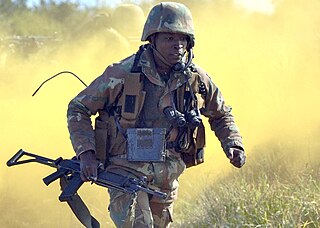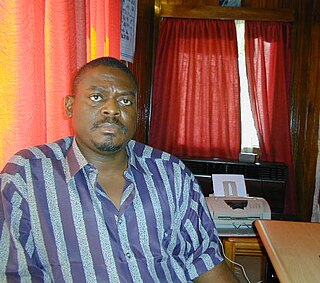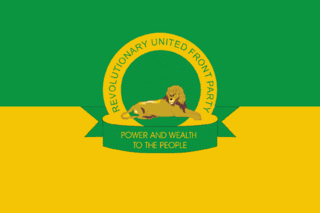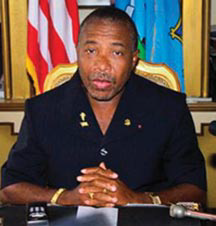Ibrahim ("Brima") Bazzy Kamara (born 7 May 1968 in Freetown) was a commander of the soldiers of the Sierra Leonean Armed Forces Revolutionary Council (AFRC) and in 2007 was convicted of committing war crimes and crimes against humanity in the Sierra Leone Civil War.

Freetown is the capital and largest city of Sierra Leone. It is a major port city on the Atlantic Ocean and is located in the Western Area of the country. Freetown is Sierra Leone's major urban, economic, financial, cultural, educational and political centre, as it is the seat of the Government of Sierra Leone. The population of Freetown was 1,055,964 at the 2015 census.

A soldier is one who fights as part of an army. A soldier can be a conscripted or volunteer enlisted person, a non-commissioned officer, or an officer.

Sierra Leone, officially the Republic of Sierra Leone, informally Salone, is a country on the southwest coast of West Africa. It has a tropical climate, with a diverse environment ranging from savanna to rainforests. The country has a total area of 71,740 km2 (27,699 sq mi) and a population of 7,075,641 as of the 2015 census. Sierra Leone is a constitutional republic with a directly elected president and a unicameral legislature. The country's capital and largest city is Freetown. Sierra Leone is made up of five administrative regions: the Northern Province, North West Province, Eastern Province, Southern Province and the Western Area. These regions are subdivided into sixteen districts.
Kamara was born in the neighborhood of Wilberforce, in the west end of Freetown. [1] In 1998, Kamara was invited by Johnny Paul Koroma to join the AFRC Supreme Council. [1] In this capacity, Kamara was a commander of the AFRC and Revolutionary United Front forces that attacked civilians in the north, east, and centre of Sierra Leone in 1998 and in Freetown in January 1999. [1]
Wilberforce is a neighborhood in Freetown, Sierra Leone. It is home to the Wilberforce military barracks, which is one of the largest and main baracks of the Sierra Leone military.

Major Johnny Paul Koroma was the head of state of Sierra Leone from May 1997 to February 1998.

Revolutionary United Front (RUF) was a rebel army that fought a failed eleven-year war in Sierra Leone, starting in 1991 and ending in 2002. It later developed into a political party, which still exists today. The three most senior surviving leaders, Issa Sesay, Morris Kallon and Augustine Gbao, were convicted in February 2009 of war crimes and crimes against humanity.
Kamara was indicted on 7 March 2003, was arrested on 29 May 2003, and his trial before the Special Court for Sierra Leone began on 7 March 2005. [2] He was tried with Alex Tamba Brima and Santigie Borbor Kanu. Kamara was found guilt of crimes against humanity and war crimes on 20 June 2007, including counts of murder, rape, forced labour, and the use of child soldiers. [2] [3] He and his codefendants' convictions were the first convictions for the Special Court for Sierra Leone and were also the first time anyone had been convicted of the international crime of using child soldiers. [3] On 19 July 2007, Kamara was sentenced to 45 years' imprisonment. [2] [4] He is serving his sentence in Mpanga Prison in Rwanda. [5] [6]

The Special Court for Sierra Leone, or the "Special Court" (SCSL), also called the Sierra Leone Tribunal, was a judicial body set up by the government of Sierra Leone and the United Nations to "prosecute persons who bear the greatest responsibility for serious violations of international humanitarian law and Sierra Leonean law" committed in Sierra Leone after 30 November 1996 and during the Sierra Leone Civil War. The court's working language was English. The court listed offices in Freetown, The Hague, and New York City.
Alex Tamba Brima, also known as Gullit, was a Sierra Leonean military commander. He was one of a group of seventeen soldiers in the Sierra Leone Armed Forces who called themselves Armed Forces Revolutionary Council (AFRC) that successfully staged a coup that ousted president Ahmad Tejan Kabbah in May 1997. On 19 July 2007 he was convicted and sentenced to 50 years in prison for committing war crimes and crimes against humanity during the Sierra Leone Civil War.
Santigie Borbor Kanu was a Sierra Leonean military commander in the Armed Forces Revolutionary Council (AFRC). He was one of a group of seventeen soldiers in the military of Sierra Leone who successfully staged a coup that ousted president Ahmad Tejan Kabbah in May 1997. In 2007, Kanu was convicted of committing war crimes and crimes against humanity in the Sierra Leone Civil War.



